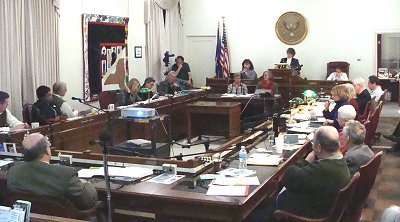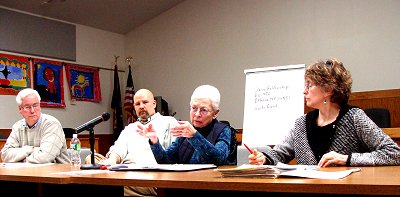- By Dan Veaner
- News
 Print
Print 
AES Cayuga Power Plant
"This is painful," Pryor told the Legislature. "This is not something that the taxpayers of Lansing are going to be able to handle very easily. It is very clear to me that at this point in time to do anything else but to support this resolution would not be in the best interest of the taxpayers of the entire county or the taxpayers of Lansing."

The Tompkins County Legislature considers supporting the
IDA / AES Cayuga PILOT agreement
PILOT agreements are negotiated to create stability in fiscal planning for large businesses and municipalities. Another advantage is that a PILOT is the result of an agreement, which prevents legal and court expenses when companies sue to have their property valuation reduced. Such lawsuits can have devastating consequences for school districts and other taxing municipalities if they are ruled against and have to return large sums of money. The AES Cayuga PILOT is a 20 year agreement that was hailed by company and municipal officials alike as a win-win solution. With the five year endgame changed from a $255 million valuation to $100 million, many have criticized it as win for the company and lose for the school district, the taxing authority with the most to lose.
Pryor was praised by Legislature Chair Martha Robertson, Legislators Brian Robison and Will Burbank, and others for finding out as much as possible about the PILOT and disseminating the information to both the Legislature and the public. She invited Robertson, County Administrator Joe Mareane, and County Department of Assessment Director Jay Franklin to a 'town hall meeting' last Saturday that attracted over 20 taxpayers looking for answers to questions about the PILOT. Notably absent were Board of Education members and school officials.
Several questions were raised about the 'smoothing effect' of stepping the valuation of the power plant over five years, how the fifth year valuation of $255 million could be reduced to only $100 million in less than a year, the consequences of the revised agreement to taxpayers, and the model used for calculating the value of the plant.
Lansing School Superintendent Stephen Grimm has taken the Tompkins County Industrial Development Agency to task for 'front-loading' the downward arc from $160 million to $130 million in the first year, and then reducing the assessment by $10 million over the following three years to reach $100 million. The IDA is the branch of County government that negotiates the PILOT with AES Cayuga. 'Front-loading' seems to benefit the plant, lowering the assessment by 18.75% next year, then by 12.5%, 11.11%, and 10% in the following three years. Grimm further notes that the timing of the most drastic drop comes when federal aid is scheduled to be withdrawn, and state aid is not predicted to fill the gap.
 |  |  |
 |  |  |
| Top Row, left to right: David Dittman and Joe Mareane, AES Cayuga Plant Manager Jerry Goodenough, Chamber of Commerce President Jean McPheeters. Bottom row: Mike Coles, AES Union Steward John Grant, School Superintendent Stephen Grimm | ||
But Robertson pointed out Saturday that the original agreement was also front-loaded. In the first two years the assessment was to rise by $20 million, and then $25 in each of the remaining five years. That came to 14.29% this year, 12.5% next year, and 13.8%, 12%, and 10.8% in the following three years.
Robertson also noted that school officials have been invited to participate in the negotiation meetings, but had only attended a few. She noted that Lansing has the highest expenditure per student in the county, and that the County had cautioned the school district that it should use the $300,000 in additional taxes gained from the agreement this year to fill reserves to cushion possible changes in the plant's value in an uncertain economy. Instead the money was used to help reduce the tax rate this year.
After the Lansing Town Board voted last month to endorse the negotiations Councilwoman Kathy Miller began rethinking her vote, saying she made a mistake voting for the resolution before learning enough about the PILOT. Since then she has been gathering information, and on Saturday she read a statement. Miller said Lansing should have been a presence at any discussions or negotiations where they were allowed, and questioned the valuation model. She defended the school district's choices and asked that the IDA acknowledge how hard the renegotiated PILOT makes it for the school district and Lansing residents.
"The very problem it was devised to address has occurred with drastic consequences to Lansing," she said. "My main concern is that the PILOT was agreed upon when the economy was already in the midst of a severe downward turn. It is hard to believe that AES and te IDA did not see how this would effect the PILOT even before it was signed."
Robertson noted that Lansing school officials and the Town Supervisor were invited to all IDA sessions.
"The agreement itself was settled in August '08 before the crash," she added. "Although the documents were signed in February '09 the numbers were agreed upon before that economic downturn started."

Lansing's County Legislator Pat Pryor held a public information
meeting Saturday. (Left to right) County Administrator Joe Mareane,
County Department of Assessment Director Jay Franklin, Pat Pryor,
County Legislature Chair and IDA member Martha Robertson
School officials did turn out for the IDA's public hearing Tuesday. Grimm and Business Administrator Mary June King were present along with school board members David Dittman and Aziza Benson. Grimm read a statement he had forwarded to the IDA over a week previously, challenging the 'front-loading' and noted that the school board had voted to not support the agreement. Others challenged the amount of the shift and challenged the model used to calculate the $100 million assessment. Dittman said that a model that could swing 250% in just one year must be unreliable.
"The citizens of Lansing have also been subject to this economic downturn," Dittman said. "Many of them have lost their jobs. Many have taken reductions in pay and zero pay increases. This PILOT increases our taxes at a time when we don't have the ability to pay."
Lansing taxpayer and State Certified General Appraiser Mike Coles spoke at length challenging the model. Coles says that the figures used to come to the $100 million number have not been independently verified, and that he had offered his services to do so, but had not been taken up on the offer. Using data publicly available Coles challenged the model and warned of dire long-term impact on the effected municipalities. He presented figures that show a $48 million negative impact over the course of the 20 years PILOT. He noted that the AES Somerset plant, also a coal-fired plant, pays $13,869 per megawatt vs the $7,477 AES Cayuga will pay n 2010. He said that AES Cayuga is one of the most profitable plants in the state.
Others spoke in favor of it. A recurring theme was the devastating impact the closing of the plant would have on the community and taxpayers, and how important it is to partner with the company to keep its doors open over the long term.
"It seems we're losing jobs every day," AES Cayuga union steward John Grant said. "These are well paying jobs with good benefits and a good, safe work environment. This new PILOT will help these jobs stay in New York, and AES is doing everything it can to keep the business here. I hope we can keep it here."
"We don't have enough power production in this state," said Chamber of Commerce President Jean McPheeters, who is also a former IDA member. "AES Cayuga is a large part of that power supply. We need them not just as an important member of our community that provides taxes and employment, but as a part of that power grid. We need to keep these good jobs here, and we need to be sensitive to their ability to pay a reasonable amount of money and for our community to be able to work with them successfully."
At Tuesday evening's Legislature meeting representatives debated the resolution to endorse the renegotiation at length. Robertson and Burbank gave a detailed summary of the public input gained at the public hearing earlier in the afternoon, paraphrasing all comments for and against.
While most legislators said they would vote for the agreement, many had reservations about the assessment model and concerns about the process. Legislator Carol Chock gave credit to the efforts and good faith shown by the negotiating team, but said she is not comfortable with committing to a four-year valuation schedule, adding that the parties need to do extra diligence for the magnitude of the revenue that will be lost.
Legislator Peter Stein said he was uncomfortable with the formula for assessing the plant, saying he didn't understand the logic of the 'ramp up and the ramp down,' and that factual numbers replace projections as much as possible. But Mareane said that the number of judgments in the model are 'fairly small.'
"I'm sure we can get better with experience," Mareane said. "More than most PILOTs I've seen this is a very fact-based approach to valuation."
Robertson said that if the IDA does not pass the PILOT that Franklin will have until March 1 to decide on a value for the plant that stands up to the scrutiny of the State Office of Property Services. That would make it much worse for the Lansing School District.
"It's clear there is justification for a value of $100 million," she said. "In October the school district would only get taxes on the basis of $100 million if that were the value that he chooses. That's something that we are hoping to avoid."
Most legislators with concerns said they were not strong enough to make them vote no, or that the alternative to a negotiated PILOT was much worse than having this one. At the end of the discussion the vote was 14-1 in favor of supporting the IDA negotiation with Chock opposed.
The County's endorsement, along with the Town of Lansing's resolution of support and the school district's rejection of the renegotiation are only expressions of stakeholder's faith in the IDA, the process of the negotiation, and the veracity of the model used to come to the $100 million valuation. The binding vote will be taken at an IDA meeting scheduled for February 24 at the old jail conference room at 125 E. Court Street in Ithaca.
----
v6i7



